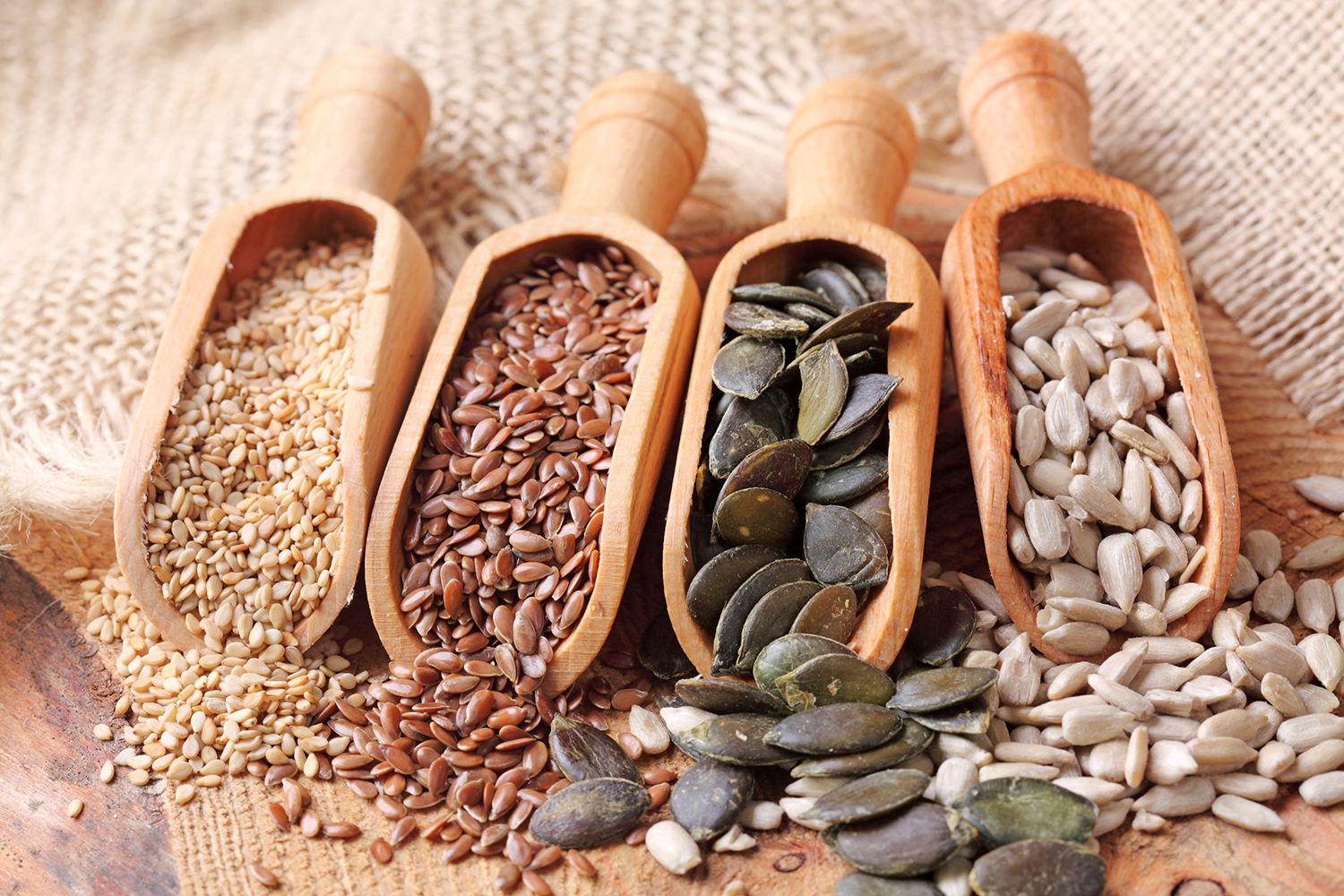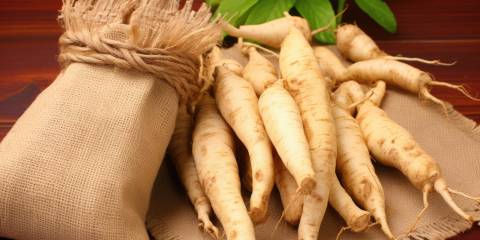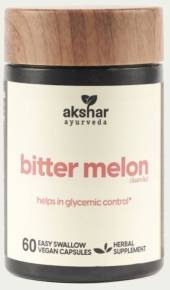Proponents of the “Seed-Cycling” trend claim that consuming two tablespoons daily of specific seeds—and changing the seed mixture midcycle—will help normalize menstrual cycles and balance out a wide range of reproductive hormone woes.
Seed Cycling Schedule
Here’s the simple routine they recommend.
-
Day 1 to 14: Follicular Phase
Menstruation to Ovulation
To support estrogen hormone balance and overall well-being:
- 1 Tbsp ground raw flaxseed plus
- 1 Tbsp ground raw pumpkin (pepita) seeds
-
Day 15 to 28: Luteal Phase
Ovulation to Menstruation
To support both estrogen and progesterone hormone balance and overall well-being:
- 1 Tbsp each ground raw sunflower seeds
- 1 Tbsp ground raw sesame seeds
Benefits of Seed Cycling
Claims for seed cycling include:
- better regulated estrogen and progesterone levels
- cycle regularity
- easier menopause transitions
- stronger bones
- reduced risk of breast cancer and other hormonedependent cancers
- enhanced fertility
- support for PMS and PCOS symptoms
...and more.
Does Seed Cycling Actually Work?
Let’s jump to the bottom line: there’s a lot of hype to this fad and only a little substance.
No studies have investigated seed cycling as a specific practice—so there’s no scientific proof it does or doesn’t work. But what’s more disappointing is that the few human studies have had mixed results. A few small studies do suggest benefits of individual seeds (or isolated seed constituents) in higher doses all month long.
Certainly, eating these seeds is healthy for most people and may have hormonal benefits. But the claims are more enthusiastic than the evidence warrants, and almost all the promotion around seed cycling comes from folks who are selling special seed-cycling products, fluffing up the limited and ho-hum research to sound better than it is.
That said, there is a small seed of truth to the hype. And assuming you’re not allergic to seeds, there’s no harm in trying. As an herbalist practitioner, I do love these seeds and often recommend that clients eat more of them in their daily routines.
Let’s explore the theory, possible benefits, and evidence for these seeds individually. In time, we may have better quality research to back up or refute the claims.
Health Benefits of Seeds
-
Rich in Fiber
First, we should recognize and admire all these seeds for their fiber content, about 1 to 2 grams per tablespoon. These seeds contain a mix of soluble fiber (which helps support healthy blood sugar and cholesterol levels) and insoluble fiber (which supports microbiome vitality and bowel regularity).
Indirectly, consuming more fiber in the diet may help with hormone balance via overall well-being—blood sugar, detoxification, and microbiome health can all affect reproductive hormone health. Your liver plays an important role in hormone conversion, and fiber also helps the liver in eliminating day-to-day metabolic waste more effectively.
-
Lignan Phytoestrogens
Flaxseeds are the best researched and most promising seed in the seed-cycling protocol for reproductive hormone health (even if most of the preliminary human studies have yielded less-thanimpressive results). They’re the best dietary source of lignans (20 grams in 1 tablespoon), a special type of fiber with mild phytoestrogenic effects that may help modulate and balance both high and low estrogen levels in the body.
Lignan phytoestrogens appear to modulate estrogen levels by binding preferentially to estrogen receptor sites yet exerting a much weaker effect than the body’s natural estrogen (and potentially problematic environmental estrogens). Lignans theoretically reduce the risk of estrogen-dependent cancers, though the evidence is mixed for how well it works.
While many experts believe lignans help protect against bone loss, the results of clinical trials have been unimpressive to date. A few small clinical trials have shown benefit for lengthening the luteal phase and promoting cycle regularity after three months.
-
Omega 3 Fatty Acids
All the seeds contain healthy fats, but the omega 3s in flaxseed are particularly noteworthy. Omega 3s are antioxidant and anti-inflammatory essential fatty acids that support nerve health, cellular function, mood, and possibly hormone balance.
Flaxseed oil is our richest plant source of omega 3s, but you’ll get quite a bit less in the whole ground seeds (2 grams per tablespoon) and higher and more bioavailable doses in fatty fish or fish oil.
-
Other Nutrients
The other seeds in this protocol are nutrition powerhouses.
Pumpkin seeds, sesame seeds, and sunflower seeds are rich in vitamin E, selenium, zinc, calcium, and other minerals that indirectly support the whole body and hormone function.
Sesame seeds also contain lignans, though only approximately one-eighth of what’s in flax, as well as fiber, healthy fats, and calcium.
Unhulled seeds have more minerals, but hulled seeds contain fewer antinutrients (which inhibit mineral absorption), so go with whatever you prefer.
Sunflower seeds are rich in vitamin E, healthy fats, protein, magnesium, and selenium.
Clinical Trials
Most of the few human clinical trials on flaxseed for hormone woes have yielded iffy or unimpressive results. But in a small study, 18 women consumed a low-fiber diet for three cycles, then the same diet supplemented with flaxseeds for the next three cycles. While shifts in hormones were minimal, participants experienced more regular cycles and ovulation, longer luteal phases, and a few other subtle shifts. Scientists concluded that flax may reduce the risk of breast and other estrogen-dependent cancers.
A randomized open-label trial of 41 people with polycystic ovary syndrome (PCOS) compared a hefty 30 grams (approximately 4 tablespoons) daily of flaxseed powder, versus no flax, alongside lifestyle modifications. After 12 weeks, those taking flax had healthier body weight, insulin, triglyceride and cholesterol levels, appetite-related hormones, and inflammatory markers, suggesting potential benefit in PCOS.
Pumpkin seeds (and pepitas) are particularly rich in zinc, magnesium, and iron and contain a special oil that may act as a 5-alpha reductase inhibitor to balance hormones. This feature is better known and researched to have a modest benefit in testosterone conversion in people with benign prostatic hyperplasia (BPH), though a few studies have investigated its benefits for ovaries or post menopause.
Lab and animal studies postulate that pumpkin seed oil may give a mild boost to estrogen levels while addressing bladder tone and urinary incontinence issues. In one of the few (small) controlled human clinical trials, 2 grams of pumpkin seed oil daily for 12 weeks appeared to raise good HDL cholesterol, reduce diastolic blood pressure, and ease hot flashes, headaches, and joint pain in post-menopausal people, and another small trial found improvements in heart rate variability and arterial stiffness that may translate to better blood pressure.
At least two small studies on women with urinary incontinence also found benefit from pumpkin seed oil combo formulas, and I have seen the oil work well in my clinical practice as well.
We don’t know if eating the ground seeds will provide enough oil for the effects seen in the studies, which used a larger dose of the isolated oil.
Seed Tips
-
Raw is Best
Raw seeds will retain the most nutrition (though arguments could be made for sprouting, toasting, or cooking pumpkin, sesame, and sunflower seeds to reduce antinutrients, lectins, and phytic acid and enhance flavor).
-
Start Slow
If you’re new to eating seeds, start slowly to limit gas, bloating, and digestive distress from a too-quick introduction of fiber.
-
Store Carefully
All these seeds go rancid easily, especially flax—at which point they become unhealthy. Buy high-quality brands, store in the fridge or freezer, and toss if they smell or taste fishy.
-
Grind Them Up
Grind to aid absorption; whole seeds are likely to pass through undigested.





